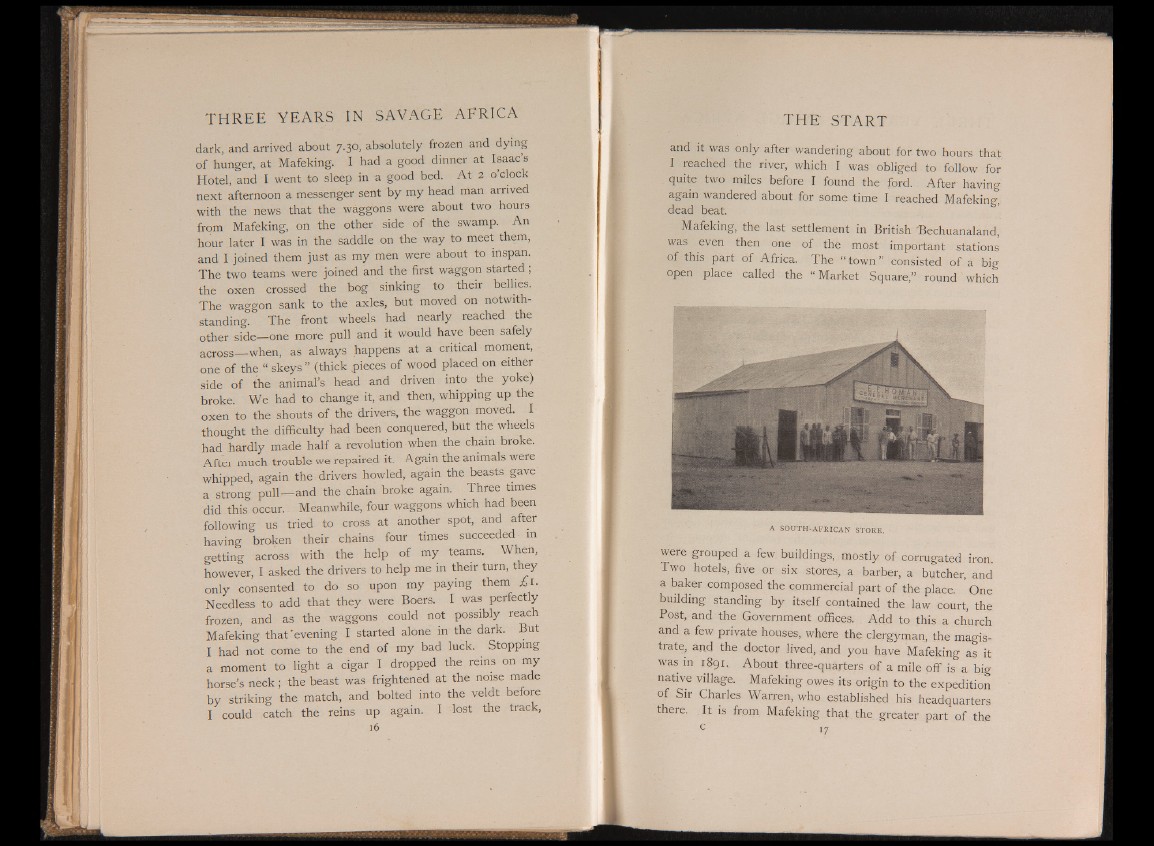
dark, and arrived about absolutely frozen and dying
of hunger, at Mafeking. I had a good dinner at Isaac’s
Hotel, and I went to sleep in a good bed. At 2 o’clock
next afternoon a messenger sent by my head man arrived
with the news that the waggons were about two hours
from Mafeking, on the other side of the swamp. An
hour later I was in the saddle on the way to meet them,
and I joined them just as my men were about to inspan.
The two teams were joined and the first waggon started;
the oxen crossed the bog sinking to their bellies.
The waggon sank to the axles, but moved on notwithstanding.
The front wheels had nearly reached the
other side—one more pull and it would have been safely
across—-when, as always happens at a critical moment,
one of the “ skeys ” (thick pieces of wood placed on either
side of the animal’s head and driven into the yoke)
broke. We had to change it, and then, whipping up the
oxen to the shouts of the drivers, the waggon moved. I
thought the difficulty had been conquered, but the wheels
had hardly made half a revolution when the chain broke.
After much trouble we repaired it. Again the animals were
whipped, again the drivers howled, again the beasts gave
a strong pull—and the chain broke again. Three times
did this occur. Meanwhile, four waggons which had been
following us tried to cross at another spot, and after
having broken their chains four times succeeded in
getting across with the help of my teams. When,
however, I asked the drivers to help me in their turn, they
only consented to do so upon my paying them £ 1.
Needless to add that they were Boers. I was perfectly
frozen, and as the waggons could not possibly reach
Mafeking that'evening I started alone in the dark. But
I had not come to the end of my bad luck. Stopping
a moment to light a cigar I dropped the reins on my
horse’s neck; the beast was frightened at the noise made
by striking the match, and bolted into the veldt before
I could catch the reins up again. I lost the track,
16
and it was only after wandering about for two hours that
I reached the river, which I was obliged to follow for
quite two miles before I found the ford. After having
again wandered about for some time I reached Mafeking,
dead beat.
Mafeking, the last settlement in British Bechuanaland,
was even then one of the most important stations
of this part of Africa. The “ town ” consisted of a big
open place called the “ Market Square,” round which
A SOUTH-AFRICAN STORE.
were grouped a few buildings, mostly of corrugated iron.
Two hotels, five or six stores, a barber, a butcher, and
a baker composed the commercial part of the place. One
building standing by itself contained the law court, the
Post, and the Government offices. Add to this a church
and a few private houses, where the clergyman, the magistrate,
and the doctor lived, and you have Mafeking as it
was in 1891.. About three-quarters of a mile off is a big
native village. Mafeking owes its origin to the expedition
of Sir Charles Warren, who established his headquarters
there. It is from Mafeking that the. greater part of the
C